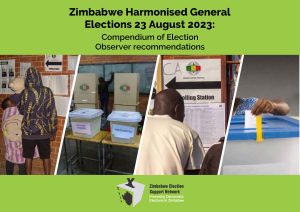The Electoral Support Network of Southern Africa (ESN-SA) and the Zimbabwe Election Support Network (ZESN) jointly deployed a ten-member observer mission with experienced observation practitioners to observe polling processes in Gauteng, KwaZulu-Natal, and Western Cape Provinces during the National and Provincial elections. The primary objective of the Joint Observer Mission was to evaluate whether the South African electoral process adhered to national laws and to determine if the country’s electoral framework aligns with regional and international principles, norms, standards, and best practices. This initiative underscores the Network’s dedication to advancing democratic integrity and transparent electoral processes throughout the Southern African Development Community (SADC) region.
METHODOLOGY
The Independent Electoral Commission (IEC) accredited the Joint Mission via an online portal. The process was simple and efficient, reducing logistical hurdles for the IEC, ESN-SA, and ZESN members. The Joint Mission deployed three (3) teams in Gauteng, KwaZulu-Natal, and Western Cape Provinces that met with electoral stakeholders, including the Independent Electoral Commission’s Provincial Representatives, the Police, Civil Society Organisations (CSOs), and Faith-Based Organisations. In its assessment of the elections, the Joint Mission used various international, regional normative and legal instruments for democratic elections as benchmarks: the African Charter on Democracy, Elections and Governance (ACDEG), the SADC Principles and Guidelines Governing Democratic Elections, the Principles for Election Management, Monitoring, and Observation (PEMMO) and South Africa’s legal framework.
The Joint Election Observation Mission closely observed special voting on May 27 and 28, 2024, and the National and Provincial Elections (NPEs) on May 29, 2024.
